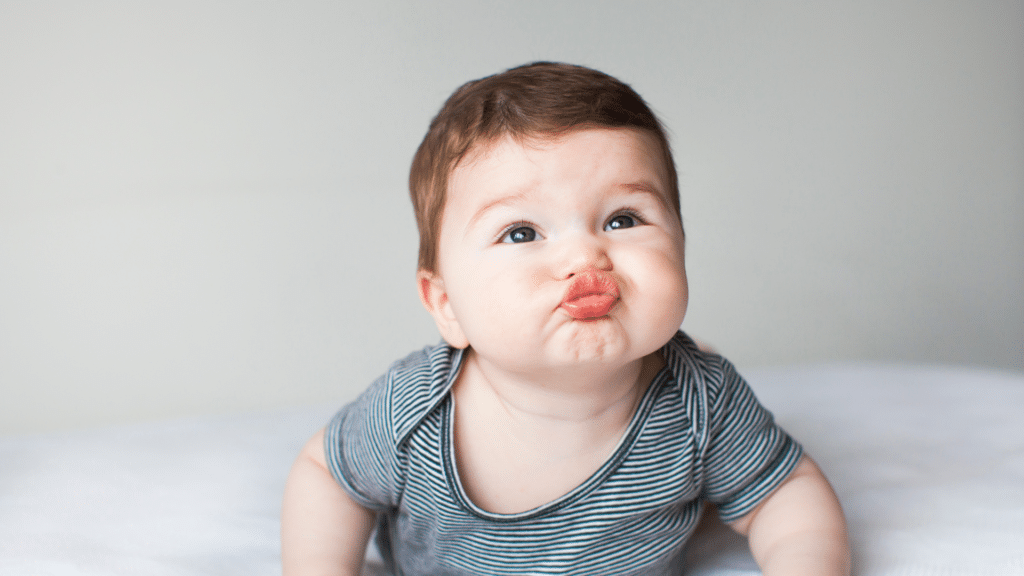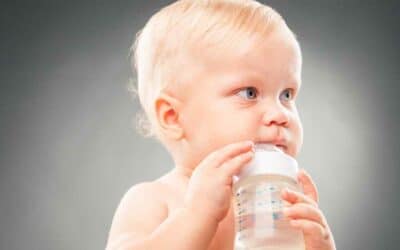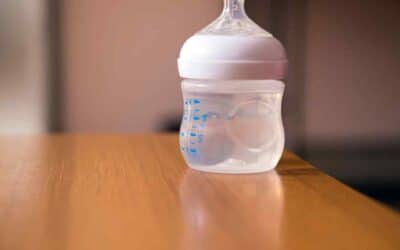As parents, our primary goal is to ensure the well-being of our little ones, and a critical aspect of this is providing them with clean and safe water. Purified water for baby health, which has undergone a series of treatment processes to eliminate impurities and contaminants, is a powerful tool for fostering your baby’s health and happiness.
In this article, we will journey through purified water, investigating various purification techniques such as distillation, reverse osmosis, filtration, and UV sterilization. By gaining insight into these methods, you can make well-informed decisions about the water sources for your baby.
We will also unveil the numerous health advantages of purified water for babies. From improved hydration and minimized exposure to contaminants to enhanced digestion and a fortified immune system, purified water is essential in supporting your baby’s growth and development.

Understanding Purified Water
Purified water has undergone various treatment processes to remove impurities, contaminants, and harmful substances. Using purified water is essential in many applications, including medical procedures and disease control, as it minimizes the risk of infection and promotes overall health. There are several methods to achieve purified water, including:
Distillation
This process involves boiling water and collecting the steam, which is then condensed into liquid form. This method effectively removes impurities, as they are left behind in the boiling chamber.
Reverse Osmosis
This method forces water through a semi-permeable membrane, which filters out contaminants and impurities. Reverse osmosis is highly effective at removing dissolved salts, organic compounds, and bacteria from water.
Filtration
Filtration systems use filters, such as activated carbon, ceramic, or sand, to remove impurities from water. These filters can effectively eliminate sediment, chlorine, and other contaminants.
UV Sterilization
Ultraviolet (UV) light kills microorganisms in water, such as bacteria, viruses, and protozoa. This method effectively disinfects water but does not remove other contaminants like chemicals or heavy metals.
Health Benefits of Purified Water for Babies
When providing the best for our little ones, purified water is crucial to their overall health and well-being. There are numerous benefits of purified water for young babies, including:
Improved Hydration
Proper hydration is essential for babies’ growth and development. Purified water ensures that your baby receives clean, safe water that helps maintain optimal hydration levels.
Reduced Exposure to Contaminants
Purified water eliminates harmful substances such as bacteria, viruses, and heavy metals, protecting your baby from potential health risks associated with contaminated water.
Enhanced Digestion
Clean water aids digestion, helping babies absorb nutrients more efficiently from their food and preventing digestive issues.
Boosted Immune System
By reducing exposure to contaminants, purified water supports a stronger immune system, helping your baby ward off illnesses and infections more effectively.

Choosing the Right Purified Water for Babies
As a parent, you must be aware of the different factors contributing to choosing the right purified water for your baby. Here are some key aspects to consider:
Evaluating water quality standards
It is essential to understand the water quality standards in your area, as these can vary from one region to another. Research the local guidelines and regulations to ensure the water you provide for your baby meets the necessary safety requirements.
Reading labels and certifications
When purchasing bottled water, always read the labels and certifications carefully. Look for trusted brands and certifications that guarantee the water has undergone rigorous purification processes, ensuring it is free from contaminants and safe for your baby.
Recommendations for safe water sources
Consult your pediatrician or a local health expert for recommendations on safe water sources in your area. They can provide valuable insights into the best options for your baby, whether tap water, filtered water, or bottled water.
Considering these factors, you can make an informed decision on the right purified water for your baby, ensuring their health and well-being.
In the context of baby formula, using the right purified water is crucial for your new baby. When preparing iron-fortified formula, it is essential to use purified water that is free from contaminants to ensure your baby receives enough nutrients and maintains optimal health.
By following the manufacturer’s instructions and using the appropriate purified water, you can provide your baby with a safe and nutritious meal, setting them up for a healthy and happy life.
Precautions and Guidelines for Using Purified Water with Babies
Introducing purified water to your baby’s diet is essential in ensuring their overall health and well-being. However, it’s crucial to follow proper guidelines and precautions to prevent serious illness and ensure appropriate water intake.
Introducing purified water gradually:
Introducing purified water to babies should be done gradually, starting with small amounts and monitoring for adverse reactions.
Proper storage and handling:
Proper storage and handling of purified water is vital to maintaining its quality and preventing contamination. Always use clean, sterilized containers and avoid exposing the water to direct sunlight or extreme temperatures.
Recommended quantities:
Recommended quantities for different age groups vary, so consult your pediatrician to determine the appropriate amount of purified water for your baby’s needs. By adhering to these guidelines, you can ensure that your baby stays hydrated and healthy while enjoying the benefits of purified water.

Integrating Purified Water into Baby’s Routine
Ensuring the health and well-being of your little one is a top priority, and one of the best ways to do this is by incorporating purified water into their daily routine. As your baby grows and develops new skills, maintaining proper hydration is essential to support their overall growth and development.
Here are the various ways to seamlessly integrate purified water into your baby’s daily life.
Mixing Formula and Preparing Baby Food
When preparing formula or baby food, purified water ensures that your baby consumes safe and clean water, free from contaminants. To integrate purified water into your baby’s feeding routine:
- Always use purified water when mixing formula or preparing baby food.
- Ensure the water is at the appropriate temperature per the formula or food preparation instructions.
- Store unused formula or baby food in a clean, sterilized container, and use it within the recommended time frame.
Maintaining Hydration During Breastfeeding
Breastfeeding mothers should also prioritize their hydration, as it directly impacts the quality and quantity of breast milk. Incorporating purified water into your daily routine can help maintain proper hydration levels and support healthy milk production. Some tips for breastfeeding mothers include:
- Keep a bottle of purified water nearby to drink throughout the day.
- Aim to drink at least 8-10 cups of water per day, or as your healthcare provider recommends.
- Monitor your urine color to ensure you are adequately hydrated; it should be pale yellow.
Using Purified Water for Hygiene Practices
Using purified water for your baby’s hygiene practices can help prevent the spread of harmful bacteria and keep your baby clean and comfortable.
Here are some ways to incorporate purified water into your baby’s hygiene routine:
- Use purified water for bathing your baby, especially if your tap water is known to contain contaminants or has a high mineral content.
- When cleaning your baby’s face, eyes, and mouth, use purified water on a soft cloth to gently wipe away any dirt or residue.
- For diaper changes, consider using purified water and a clean cloth or cotton balls for cleaning your baby’s bottom instead of using commercial wipes that may contain harsh chemicals.
Creating a Purified Water-Friendly Environment
To ensure your baby enjoys the benefits of purified water throughout their daily routine, consider creating a purified water-friendly environment in your home:
- Install a water filtration system or use a water purifier to provide clean water for your baby’s needs.
- Regularly clean and sterilize bottles, pacifiers, and other feeding equipment with purified water.
- Consider using a humidifier with purified water to maintain optimal humidity levels in your baby’s room, especially during dry seasons or in air-conditioned environments.
Integrating purified water into your baby’s daily routine ensures their health and well-being are well taken care of. With these tips in mind, you can give your little one the best possible start in life, promoting their overall health and happiness.

Practical Tips for Using Purified Water with Babies
It’s natural for parents to feel guilty if they think they’re not providing the best for their infants.
Here are some practical tips to ensure your little one stays hydrated with purified water, whether you’re at home or on the go, and to help you feel confident in providing enough water for your baby:
Portable water options for outings and travel
Invest in a high-quality, BPA-free water bottle to carry purified water for your baby while traveling or going out. You can also opt for portable water purifiers or purification tablets to ensure the water you give to your baby is always safe and free from contaminants.
Ensuring water safety at home
Consider installing a water filtration system at home or using a water purifier to provide clean water for your baby’s needs. Regularly check and maintain the system to ensure its effectiveness. Also, properly clean and sterilize your baby’s bottles and feeding equipment to avoid any risks associated with contaminated water.
Dealing with potential challenges
Sometimes, you may encounter challenges like water supply interruptions or emergencies that could affect the availability of purified water. To be prepared, keep bottled purified water at home and familiarize yourself with alternative water purification methods, such as boiling or using purification tablets. This way, you can ensure your baby always has access to safe and clean water, no matter the circumstances.
Importance of Testing Your Water Source
In our dedicated pursuit of providing clean and purified water for our baby, an often overlooked, yet crucial aspect, is testing our water source. In this section, we will explore why water testing is important and how to go about it.
Why Test Water
Water testing offers an accurate analysis of the water used in your home. This significant step verifies whether or not the water source meets safety standards for your baby. Municipal water sources are typically treated and regulated, but issues can still crop up in your home due to aging infrastructure, pipes, or potential contamination on its journey from the water treatment plant to your home. If you draw water from a private well, it’s especially crucial to test regularly, as these sources aren’t regulated or monitored by municipalities.
Did You Know: Even bottled water can have contaminants depending on its source and the effectiveness of the purification process used by the manufacturer. Hence, being vigilant about your water source is extremely important.
How To Test Water
Water testing kits are readily available and provide immediate results for most common contaminants. These kits usually test for the presence of harmful bacteria, lead, pesticides, nitrates/nitrites, chlorine level, hardness, and pH.
For a more comprehensive analysis, consider sending a water sample to a certified laboratory. These facilities can test for a broad spectrum of contaminants, thus providing a detailed understanding of your water quality.
What to Do If Your Water Fails the Test
If your test results detect contaminants in your water, don’t panic. Solutions range from installing an appropriate water filter to treat the specific contaminants to using bottled water for your baby’s needs. In some cases, it might be beneficial to seek professional guidance to evaluate the best course of action for your specific situation.
Adopting regular water testing as part of your routine ensures you are aware of the quality of your baby’s water. Being proactive about your baby’s health means taking precautions where you can, and water testing provides that security. It helps you adopt the necessary measures to safeguard your baby’s health and ultimately, their growth and happiness.
Quality water is a critical nutrient for all life stages, more so for your little one. So, make sure you give them the cleanest water possible. By testing your water source, you can rest assured that you’re taking a significant step in nurturing your baby’s health. — making testing your baby’s water, not just an option, but a necessary part of their health and happiness!

Conclusion
In conclusion, purified water plays a significant role in promoting the health and happiness of your baby. By understanding the different purification methods and their benefits, you can make informed decisions about the best water sources for your little one.
Remember to consult your pediatrician and follow proper guidelines when introducing purified water into your baby’s routine. By taking these steps, you can ensure your baby stays hydrated, healthy, and happy as they grow and develop. So, embrace the power of purified water and give your baby the best start in life.
Let us know in the comments below if this article was helpful to you. If you have any questions, feel free to ask!



